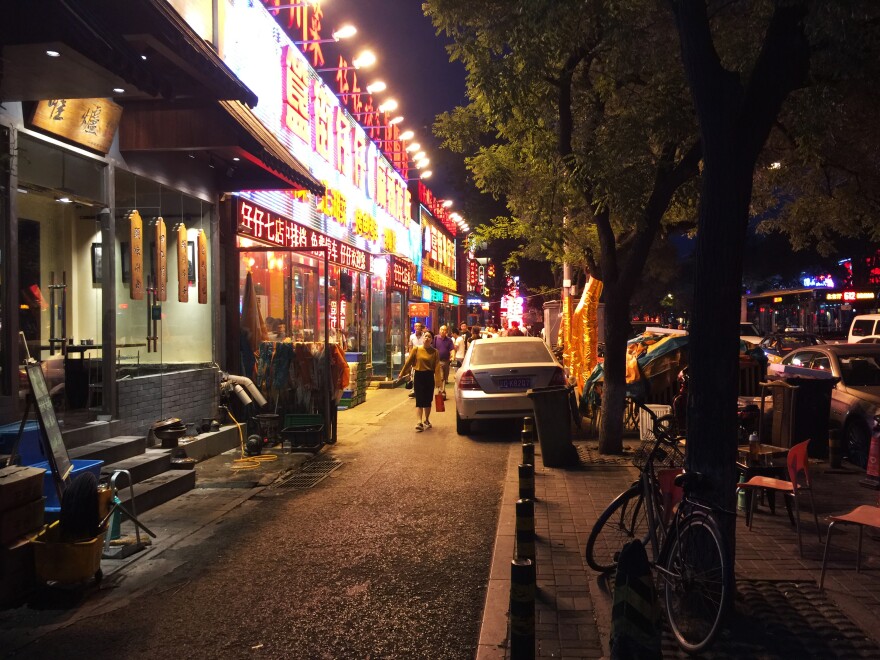For the past couple of decades, night owls with the munchies have flocked to a certain street in Beijing that is packed with all-night restaurants. The sidewalks are jammed with cars and have a perpetual patina of rancid-smelling cooking oil.
One of the trendier restaurants on the block is called A Very Long Time Ago. The decor is upscale Paleolithic, with silhouettes of cavemen traipsing across the walls. The clientele is not so fossilized. They're mostly 20-somethings who roast skewers of food over hot coals.
Young Chinese restaurant customers willing to pay for better service are leading a small-scale revival of tipping not seen in Chinese restaurants for decades. The trend began at this restaurant last October, and is so far confined to Beijing, Shanghai and other top-tier cities.
Every few minutes at A Very Long Time Ago, a prerecorded message informs diners that if they like the service, they can use their smartphones to scan QR codes that the waitstaff wear on their sleeves. This generates a tip of 4.56 yuan, about 70 cents. Diners can tip as many times as they want.
"To customers, that's like just a game," says restaurant owner Song Ji. He invented this system, which he claims is the first of its kind in China.
The important thing, Song says, is to keep the tips small in proportion to the bill, so the bonus doesn't become an onus on customers.
"Where the average bill is $30 per person," he says, "I recommend a tip of no more than 70 cents."
In other words, he suggests tipping the wait staff about 2.5 percent of the bill. Song is 32, and he runs a chain of 36 eateries in three cities, including this one.
He's just back from the U.S., where he visited restaurants in Chicago and Los Angeles. He says he felt that tipping has not only become a burden on American customers, but more importantly, it has lost its meaning.
"No matter how bad the service gets, you still have to give a 15 percent tip," he observes. "That's no good!"
Song pulls out his cellphone to show me statistics on tipping at all of his restaurants. There's an app for that, of course, and it shows how many times each member of the waitstaff has been tipped at each restaurant, and how much money they've earned in total.

This restaurant's top tip-taker is 20-year-old Liu Enhui. In addition to her base salary of about $450 a month, she says she can get as many as 60 tips in an evening.
"It's important to me. I take in anywhere from $15 to $30 in tips a day," she explains. "Over the course of a month, it really adds up."
She says that getting fewer tips motivates her to work harder and try to strike up a conversation with customers.
At A Very Long Time Ago, most of the customers do tip. One regular, who only gives his last name, Yu, says that at a restaurant like this one, service matters.
"Especially when you're grilling meat, you don't know if it's cooked through or not," he explains. "The waiter or waitress can show up at the right time to tell you when it's ready."
Feng Enyuan, deputy director of the Chinese Culinary Association, points out that forms of tipping did exist in China before the Communist revolution. In some restaurants, satisfied customers would toss change into a bamboo tube next to the cashier.
But the practice was wiped out along with private enterprise in the 1950s. During the height of Maoism in the 1960s and 1970s, very few people ate in restaurants, and the very idea of one person serving another was seen as anathema, and a form of capitalist exploitation.

Feng says reintroducing the practice of tipping has to be done slowly and cautiously. He offers this advice to restaurateurs:
"Don't ruin a good thing," he counsels. "Whatever you do, don't make things difficult for customers or make them feel uncertain about what to do."
For now, he predicts, tipping is likely to remain limited to young, smartphone-equipped customers at trendy restaurants in China's top cities.
Copyright 2021 NPR. To see more, visit https://www.npr.org.



